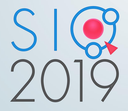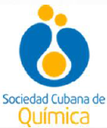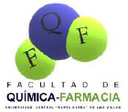Executive Secretary

VII Simposio Internacional de Química 2019
SIQ 2019
Streptococcus pneumoniae is one of the fundamental causes of pneumonia, meningitis, otitis and sepsis worldwide. The main strategy to prevent these diseases is based on immunization with conjugate vaccines, where the capsular polysaccharide (PsC) is covalently linked to a carrier, usually a protein. These vaccines manage to induce powerful immune responses and generate immunological memory against the bacteria. Nowadays, the main aim is to improve the pharmacological properties of the conjugate is using more effective conjugation methodologies that allow to obtain conjugates without free polysaccharide, a problem that affects the effectiveness of the formulation generating a mixture of immune response of IgG and IgM type. The type of reactions that gives us that ease and effectiveness of conjugation are the click reactions. In our case, we chose as a model 1,3-dipolar cycloaddition of copper-catalyzed azide-alkyne (Cu), since it is known as the classic click reaction and has been widely studied. By functionalizing the protein with azide groups and the capsular polysaccharide with alkyne groups, we were able to carry out their conjugation by classical catalysis with copper sulfate (CuSO4) and sodium ascorbate (NaAsc), and methodologies based on novel catalysts of core Shell nanoparticles of Copper and Iron (Cu@Fe NP) and iron nanoparticles covalently linked to a copper (I) complex, which is the catalyst specie. The conjugates obtained were characterized by high performance liquid chromatography and colorimetric methods. The identity and antigenicity of the conjugates obtained by means of techniques such as quantitative 1H-NMR and DotBlot were verified. The conjugates are immunogenic, and induce an immune response of IgG type similar to that generated by conjugates to TT. This work constitutes the first report of the use of novel catalysis systems based on nanoparticles of the click reaction, 1,3-dipolar azide-alkyne cycloaddition.
Streptococcus pneumoniae is one of the fundamental causes of pneumonia, meningitis, otitis and sepsis worldwide. The main strategy to prevent these diseases is based on immunization with conjugate vaccines, where the capsular polysaccharide (PsC) is covalently linked to a carrier, usually a protein. These vaccines manage to induce powerful immune responses and generate immunological memory against the bacteria. Nowadays, the main aim is to improve the pharmacological properties of the conjugate is using more effective conjugation methodologies that allow to obtain conjugates without free polysaccharide, a problem that affects the effectiveness of the formulation generating a mixture of immune response of IgG and IgM type. The type of reactions that gives us that ease and effectiveness of conjugation are the click reactions. In our case, we chose as a model 1,3-dipolar cycloaddition of copper-catalyzed azide-alkyne (Cu), since it is known as the classic click reaction and has been widely studied. By functionalizing the protein with azide groups and the capsular polysaccharide with alkyne groups, we were able to carry out their conjugation by classical catalysis with copper sulfate (CuSO4) and sodium ascorbate (NaAsc), and methodologies based on novel catalysts of core Shell nanoparticles of Copper and Iron (Cu@Fe NP) and iron nanoparticles covalently linked to a copper (I) complex, which is the catalyst specie. The conjugates obtained were characterized by high performance liquid chromatography and colorimetric methods. The identity and antigenicity of the conjugates obtained by means of techniques such as quantitative 1H-NMR and DotBlot were verified. The conjugates are immunogenic, and induce an immune response of IgG type similar to that generated by conjugates to TT. This work constitutes the first report of the use of novel catalysis systems based on nanoparticles of the click reaction, 1,3-dipolar azide-alkyne cycloaddition.
Sobre el ponente

Lic. Dayan Viera Barredo






